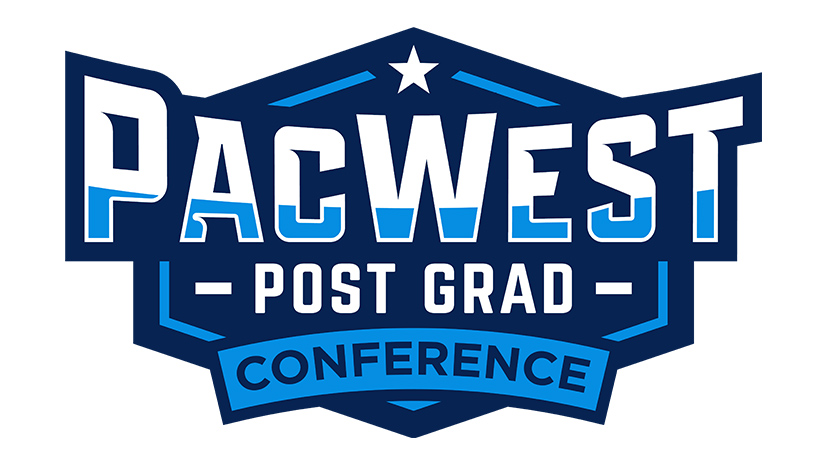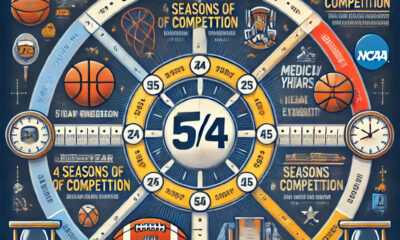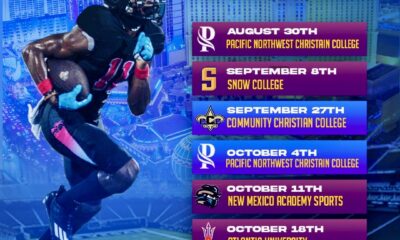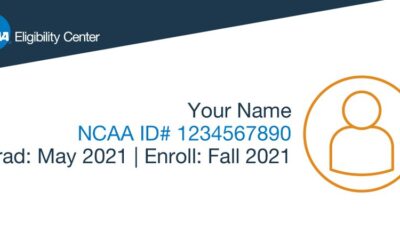Academics
Benefits of taking college classes while in Post Grad
Benefits of taking college classes while in Post Grad
-
-
by
PWPGC

Taking college classes while participating in a Post-Grad Academy can offer a variety of benefits, both academically and athletically. Here are several advantages:
- Academic Progression
– Earn College Credits: By taking college-level courses, players can earn college credits that count toward their degree, which can help them progress academically while also advancing their sports careers.
– Stay on Track for Graduation: If you plan to attend a college or university later, completing college courses in a Post-Grad Academy can keep you on track to meet graduation requirements for a degree program, especially if you take general education or prerequisite courses.
– Dual Enrollment Opportunities: Some programs allow you to dual enroll in both high school and college courses, providing a head start on your college education and easing the transition to a full-time college student later on.
- Athletic Advantages
– Showcase Academic Maturity: Playing in a post-grad academy demonstrates your maturity and commitment. Adding college courses to your schedule shows colleges and recruiters that you’re serious about both academics and athletics, making you a more attractive recruit.
– Eligibility for College Recruitment: By completing college-level coursework, you can fulfill NCAA or other eligibility requirements for sports scholarships, particularly for student-athletes looking to transition to D1 or D2 programs.
– Flexible Scheduling: Many post-grad programs offer flexible schedules for athletes, allowing you to balance practice, games, and classes. Taking college courses while also developing your athletic skills can help you manage both areas simultaneously.
- Increased College Recruiting Opportunities
– Demonstrates Commitment and Discipline: Taking college classes while playing football or any post grad sport shows recruiters that you are well-disciplined, capable of managing multiple responsibilities, and committed to both your education and athletic career.
– Better College Options: By excelling both academically and athletically, you increase your chances of attracting scholarship offers from schools with strong football, basketball and other sports programs and higher academic standards.
– Maintain NCAA Eligibility: For athletes aiming to go to a major college program, maintaining eligibility in both athletics and academics is crucial. By taking college-level courses while in a Post Grad Academy, you ensure that you don’t fall behind in meeting NCAA academic requirements.
- Personal Development and Career Readiness
– Time Management Skills: Balancing Post Grad sports with college courses teaches valuable life skills like time management, prioritization, and organization, which are transferable to any future career, whether in sports or beyond.
– Networking Opportunities: College classes provide the chance to meet professors, classmates, and other athletes, which can expand your personal and professional network. This can open doors for future opportunities, such as internships or connections with athletic departments.
– Career and Life Skills: Even if your athletic career doesn’t extend beyond the Post Grad academy or if you want to pursue a post-sports career, having a college education gives you a solid foundation for any future job or educational pursuit.
- Physical and Mental Growth
– Intellectual Stimulation: Balancing Post Grad sports with college coursework provides intellectual stimulation that can enhance your focus and cognitive function on and off the field. Engaging in academic work challenges the brain in ways that football alone may not.
– Social and Mental Balance: Playing sports at a high level can sometimes be mentally taxing. Engaging in college courses can provide a mental break from the physical grind of football, promoting a healthier balance and preventing burnout.
– Confidence Boost: Successfully managing both college academics and Post Grad sports shows you can handle multiple responsibilities. This can build confidence and resilience, traits that will benefit you in both athletics and life.
- Long-Term Benefits
– Improved GPA for College Applications: If you plan to transition to a four-year school, taking college courses while in the academy may allow you to improve your GPA and strengthen your college application, potentially helping you get into a better school or securing additional scholarship offers.
– Career Options After Sports: Not all athletes make it to the pros, and the reality is that a football career may end sooner than expected due to injury or other factors. Taking college classes ensures that you have academic credentials that can open up other career paths once you finish playing sports.
– Transitioning to College Life: By taking college classes during your time in the Post Grad sports academy, you can ease the transition into full-time college life, both academically and socially. You will have already adjusted to the demands of higher education, which can help you manage your responsibilities better once you enter a traditional college environment.
- Developing a Holistic Athlete Profile
– Well-Rounded Student-Athlete: Many top-tier schools and recruiters are looking for athletes who excel in multiple areas. A player who is both athletically gifted and academically inclined is often seen as a more valuable long-term investment for the program.
– Leadership and Work Ethic: Successfully juggling football and academics can demonstrate strong leadership qualities, work ethic, and perseverance—qualities that are highly valued by football coaches and recruiters.
Taking college classes while in a Post-Grad Academy is a smart strategy for athletes who want to maximize their opportunities in both sports and education. It not only enhances your chances of college recruitment and eligibility but also helps you build a strong foundation for your future career and life after football. It’s a great way to prepare for the next steps, whether that involves continuing with a sport at the collegiate level or transitioning to a professional career in a different field.


Must See
-


Academics
/ 1 year agoBreaking down the college 5/4 rule and benefits it has after attending a Post Grad Sports Academy
What is the College NCAA 5/4 rule
By PWPGC
 ad code here
ad code here Title
-


Football
/ 7 months agoPacWest Post Grad Conference Kicks Off with Inaugural 2025 Football Season Schedule for Perazen Elite Prep Academy
The stage is set for an electrifying debut as the PacWest Post Grad Conference...
By PWPGC -


Academics
/ 12 months agoPost High School program provides an opportunity to advance your college sports career!
The PacWest Post Grad Conference offers student-athletes an exceptional opportunity to gain exposure through...
By PWPGC








